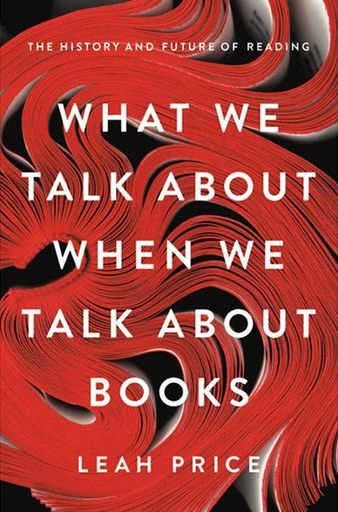Lunch Date: What we talk about when we talk about talking about books
(Once in a while, we take a new(ish) book out to lunch and give it half an hour or so to grab our attention. Lunch Date is our comment on that speed-dating experience.

Who’s your date today?
What We Talk About When We Talk About Books, by Leah Price. Subtitled "The History and Future of Reading," it's about…the history and future of reading. Why print books aren't dead, why people say they are, why everything anyone says about reading is wrong. You know the sort of thing.
Where’d you go?
I was going to take this book out on a real date, to Mulleady's in Magnolia — Irish pub, not fancy, but well-regarded. As it turned out, though, I made dinner for us both at home. I thought we'd get along better than we did….
What’d you eat?
Farro, roasted mushrooms, crumbled parmesan. Appropriately, I read as many pages I could take while distracted by boiling water, beeping timers, and several sorts of salt. We are neither good nor enthusiastic cooks in this house.
How was the food?
Brown.
What does your date say about itself?
From the publisher’s promotional copy:
Digital-age pundits warn that as our appetite for books dwindles, so too do the virtues in which printed, bound objects once trained us: the willpower to focus on a sustained argument, the curiosity to look beyond the day's news, the willingness to be alone.
The shelves of the world's great libraries, though, tell a more complicated story. Examining the wear and tear on the books that they contain, English professor Leah Price finds scant evidence that a golden age of reading ever existed. From the dawn of mass literacy to the invention of the paperback, most readers already skimmed and multitasked. Print-era doctors even forbade the very same silent absorption now recommended as a cure for electronic addictions.
The evidence that books are dying proves even scarcer. In encounters with librarians, booksellers and activists who are reinventing old ways of reading, Price offers fresh hope to bibliophiles and literature lovers alike.
Is there a representative quote?
It’s hard to choose a representative quote without feeling that you’re stacking the deck. But let’s try this one:
When familiarity wanes, so does contempt. Once scarce and sacred objects, books entered European life half a millennium ago thanks to paper (a portable and durable medium of which Europeans were late adopters) and print (which changed books from rarities to be worshipped to tools to be used). In restoring the printed book to a pedestal at the very moment when it's being shunted to the edges of everyday life, we circle back to the era when print looked like the latest newfangled gimmick. Perhaps print is to digital as Madonna is to whore: we worship one but use the other.
Aside from the arguable (not really) misogyny of the closing metaphor, is there anything in this passage that is not cliché, either literal (pedestals! newfangled!) or rhetorical (this so that, this and that, this to that)?
Will you two end up in bed together?
I'll be honest: I anticipated writing a full review of this book but gave up after the intro and half a chapter. No, wait, I'll be more honest: I anticipated writing a full review of I Don't Think of You (Until I Do), but that book was so interesting and tantalizing and well done that I stopped (after reading and before writing), wanting more time to digest it, even though it's composed of only 101 short passages over 103 pages (or 104 if you count the illustration of mice fucking).
What We Talk About When We Talk About Books, on the other hand, tells you everything you need to know straight from the title. That is: every sentence is a take, hot or cold, an echo off of something someone else has written or said. It is ironic for the most frequent author of this publication's Sunday Post — which is really nothing at its worst but a collection of takes and at its best a collection of amusing takes — to crook a brow at another hot-taker. Still.
Most people who read, and perhaps I should say all, know why they do. The "why" is not homogenous, though many reasons are common enough that readers feel community with each other: childhood isolation comforted with stories, a vast curiosity answered with pages (print or digital). No evidence base can prove or disprove the value of the word as story. No double-blind trial can tell a reader more than they already know.
Does that sound romantic? It's not intended to. In fact it's simple practicality. People read because it's necessary to them to do so. Watching football is necessary to others. We don't need reading to be special or privileged; it is what it is, to each of us. True, it does not cause concussion, unless done very badly, and in that way it is superior to almost all sports.
This is a long way of saying that a book about the value of reading seems beside the point, no matter how well done (which is not to say this book seemed particularly well done, at least over the course of a few dozen pages). Talking about the economic impact of Amazon.com on independent bookstores, and how different shifts in the market or in public consumption affect the chances that we'll all be able to continue on with our favorite way of interacting with words, is interesting and useful. Talking about whether books affect compassion, or ameliorate depression, or whether print is archaic or the original bleeding edge, is like throwing the barn door wide while complaining that it wasn't locked.
So, no. We won't even be just friends. There are too many other books to read!